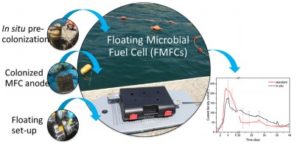The continuous progress of bio-science has led to the discovery that bacteria can directly produce electricity, degrading organic substances dissolved in natural environments, e.g. sea water, river, lake or wastewater treatment plants of municipal wastewater or agro- food and soil contaminated by heavy metals or organics.
Microbial fuel cells (MFCs) are a new and exciting area in biotechnology which have operational and functional advantages over the technologies currently used for generating energy from organic substancies. They allow to convert energy, available in bio-convertible substrate, directly into electricity with the aid of microorganisms. MFCs operate efficiently at ambient, and even lower, temperatures distinguishing them from most of thecurrent bio-energy processes. An MFC does not require gas treatment because the off-gases of MFCs are enriched in carbon dioxide and normally have no useful energy content. Furthermore, MFCs have potential for widespread application in locations with no electrical infrastructures and also to expand the diversity of fuels we use to satisfy our energy requirements. A typical MFC consists of an anode and a cathode compartment where in the anode compartment a substrate is oxidized by microorganisms activity while in the cathode compartment an electron acceptor is reduced.

In situ continuous current production from marine floating microbial fuel cells

